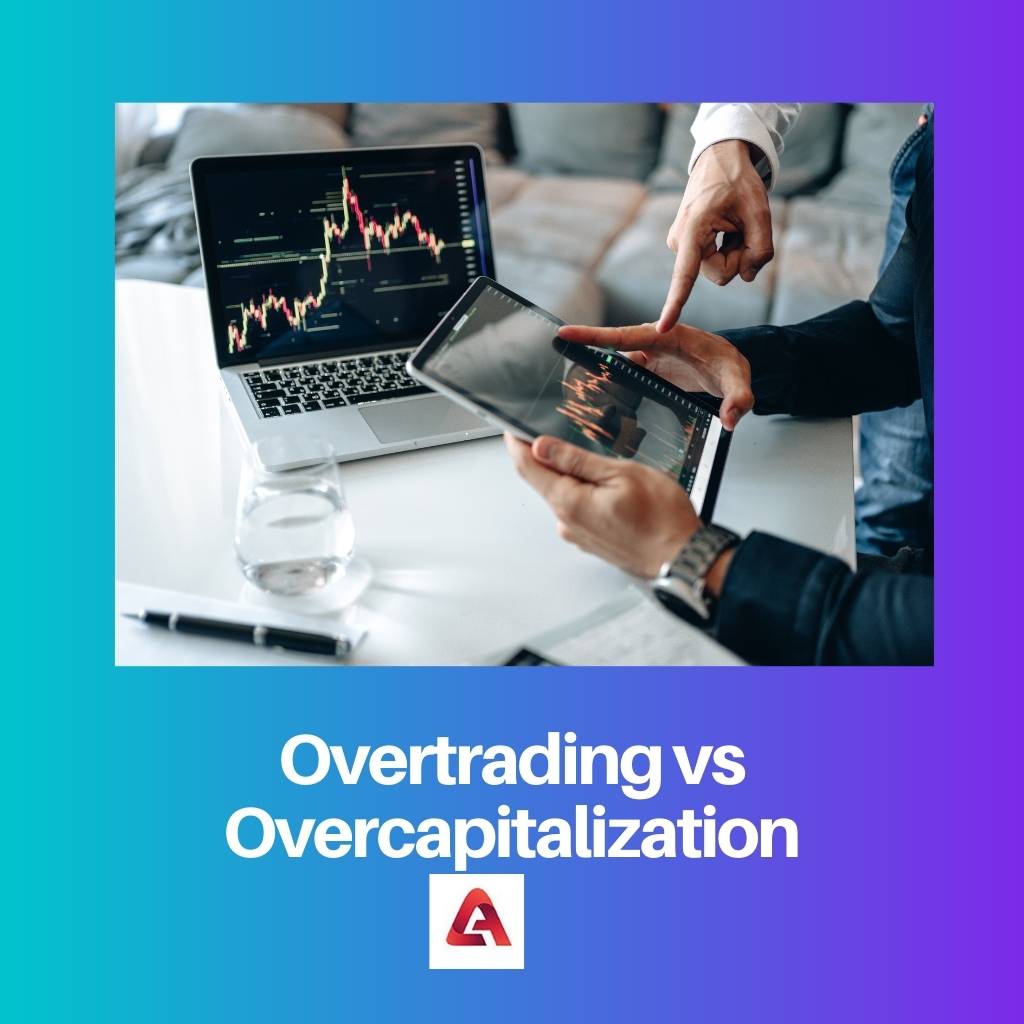Running a business in today’s competitive world is not an easy task. It requires consistent and diligent efforts. The company might do more trading than they have anticipated. Sometimes they might invest in more debt.
There are two methods to overcome this. Overtrading and Overcapitalization will be a good solution to their problem.
Key Takeaways
- Overtrading occurs when a business expands too rapidly, resulting in insufficient working capital to support operations.
- Overcapitalization happens when a company’s capitalization exceeds its actual value, reducing profitability and inefficiencies.
- Addressing both issues requires different approaches: Overtrading may necessitate increasing working capital or adjusting operations, while overcapitalization might involve reducing capital or increasing revenue generation.
Overtrading vs Overcapitalization
Overtrading occurs when a business trades more than its financial resources can support, leading to financial instability and bankruptcy. Overcapitalization occurs when a company has more capital than it needs for its operations, leading to inefficient use of resources and reduced profitability.

In order to avoid this risk of overtrading, the broker or individual traders should have some self-control practices such as self-awareness and risk management.
There may be many reasons for overtrading, and the result will sometimes be good and poor. It depends on the type of work we do and where we invest that money for trading purposes.
Overcapitalization primarily occurs due to investments in debt and equity. In order to escape from Overcapitalization, there is one method for it. The first thing the company is expected to do is reduce the debt load.
They can even buy the shares of the dividend payments as well. Even Restructuring the company will also become a solution to this problem.
Comparison Table
| Parameters of Comparison | Overtrading | Overcapitalization |
|---|---|---|
| Definition | It is the process of buying or selling stocks excessively. | It is the process of investing in debts. |
| Advantages | It reduces the risk of inventory levels. | The company will have excess cash in its sheet balance. |
| Disadvantages | It will result in loss because of trading without taking care of risks. | When we do reorganization, many problems will be created. |
| Working Capital | It will be less in overtrading. | It will be high in overcapitalization. |
| Funds | Funds will be restricted. | Funds will be managed in a poor way. |
What is Overtrading?
Overtrading is defined as buying or selling excessive stocks. This can be done by brokers as well as individual traders. Both have different kinds of impacts, situations, and implications. They can frame the number of risks to be taken.
Because if they take too much risk, it will lead to the destruction of the company. They have all right to take risks when it comes to business. They even consider the number of trades that are appropriate.
If they reach a certain limit, then continuing it will become difficult. It will be bad either for the trader or broker, but it did not matter to the outsiders. This happens when they do overtrade by buying excessive shares and shocks without seeing any improvement.
This will definitely lead to a problem. It will be observed by the investors when they find a surge in their development and profit. Also, the commission amount will be high when they overtrade without any business development.
There are three types of overtrading Discretionary Overtrader, Technical Overtrader, and Shotgun Overtrader.
There are a few steps by which we can prevent overtrading as exercising self-awareness, taking a break from work, Creating rules before doing something, and should be committed to risk managing factors.

What is Overcapitalization?
Overcapitalization will occur when the company invests in more debt and equity without considering the assets of the company. This, in turn, will reduce the market value of the company more than what it has anticipated in the total value of the company.
If a company is overcapitalized, then it will pay more interest and as well dividend payments. This will continue for a long period of time.
It depends upon the company and how faster they are taking care of the situation. The interest and the dividend payments may or may not sustain for a long period of time, depending upon the amount of money they have capitalized.
If they overcapitalize beyond their limits and capacity, it will eventually lead to company bankruptcy. The company will face huge losses because of this, and it will be difficult for them to pay their employees. This, in turn, will result in unemployment.
The opposite of overcapitalization is undercapitalization. The term overcapitalization is used in industrial markets and their areas. This will affect the low-premium insurance policies.
But it has one good advantage, and that is why some companies are still practising that. It helps to maintain the excess cash in the form of a balance sheet. This cash will help us to return the nominal rate, which in turn will increase the company’s liquidity.

Main Differences Between Overtrading and Overcapitalization
- In overtrading, the company’s management can be increased without investing more capital. On the other hand, in overcapitalization, the market value of that company will be less when compared to the capitalization of that particular company.
- In overtrading, more working capital will be less needed. On the other hand, in overcapitalization, working capital will be more needed.
- In overtrading, the effective rate may either remain or increase. In overcapitalization, it will be less when compared with other capitalization.
- Overtrading can be reduced by practising some self-awareness techniques. But overcapitalization will be reduced only when the company meets the selected criteria.
- In the future, the company cannot invest because of the losses it faced earlier. But in overcapitalization, the company will be in an invested state for the future.




